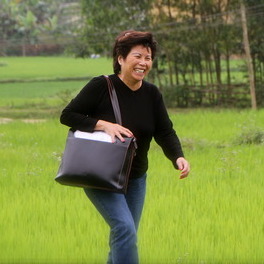A Quote by Nick Hornby
I never mind the accusations of domesticity, as long as people recognise that all of us, even the luckiest, will live lives in which we have our hearts broken, suffer the loss of loved ones, worry ourselves half to death about our kids.
Related Quotes
But how to know the falsity of death? How can we know there is no death? Until we know that, our fear of death will not go either. Until we know the falsity of death, our lives will remain false. As long as there is fear of death, there cannot be authentic life. As long as we tremble with the fear of death, we cannot summon the capacity to live our lives. One can live only when the shadow of death has disappeared forever. How can a frightened and trembling mind live? And when death seems to be approaching every second, how is it possible to live? How can we live?
We need to be realistic and recognize that there will be times when we won't be sharing our faith out of an overwhelming sense of joy. When that happens, that's a call to look at our own devotional lives. Are we putting our hearts and minds before the Lord and under his cross everyday? Do we remind ourselves continually that we have been ransomed by the death of the Saviour? When we meditate on Christ's death for us, it doesn't mean that we never have struggles in our obedience, but it does help.
People worry about kids playing with guns, and teenagers watching violent videos; we are scared that some sort of culture of violence will take them over. Nobody worries about kids listening to thousands - literally thousands - of songs about broken hearts and rejection and pain and misery and loss.
Unfulfilled dreams, ongoing relational tension, the loss of friendships, a hard marriage, rebellious teenagers, the death of loved ones, remaining sinful patterns - whatever it is for you - live long enough, lose enough, suffer enough, and the idealism of youth fades, leaving behind the reality of life in a broken world as a broken person.
Women will not be free
until we can speak our minds and our hearts
without having to worry that men will crucify us,
women will crucify us,
the press will crucify us,
or our children will be ashamed...
Women are still in emotional bondage
as long as we feel we have to make
a choice between being heard
and being loved.
A lover of what is looks forward to everything: life, death, disease, loss, earthquakes, bombs, anything the mind might be tempted to call 'bad.' Life will bring us everything we need, to show us what we haven't undone yet. Nothing outside ourselves can make us suffer. Except for our unquestioned thoughts, every place is paradise.
More than we care about their "success," vocation, or financial status, our hearts will be encouraged when our kids are faithful followers of Christ, and our hearts will be distressed when our kids appear to reject the Christian faith. So, the most important thing is transferring our kids' allegiance from us to Christ, raising faithful disciples who seek first the kingdom of God and his righteousness.
When we are in love, our love is too big a thing for us to be able altogether to contain it within ourselves. It radiates towards the loved one, finds there a surface which arrests it, forcing it to return to its starting-point, and it is this repercussion of our own feeling which we call the other's feelings and which charms us more then than on its outward journey because we do not recognise it as having originated in ourselves.
He comes to us in the brokenness of our health, in the shipwreck of our family lives, in the loss of all possible peace of mind, even in the very thick of our sins. He saves us in our disasters, not from them. He emphatically does not promise to meet only the odd winner of the self-improvement lottery. He meets us all in our endless and inescapable losing.
Our ego ideal is precious to us because it repairs a loss of our earlier childhood, the loss of our image of self as perfect and whole, the loss of a major portion of our infantile, limitless, ain't-I-wonderful narcissism which we had to give up in the face of compelling reality. Modified and reshaped into ethical goals and moral standards and a vision of what at our finest we might be, our dream of perfection lives on--our lost narcissism lives on--in our ego ideal.
The arts have long been an integral and vibrant part of our nation's cultural heritage. In its many forms, art enables us to gain a deeper understanding of ourselves and of our society. Providing us with a unique way to learn about people of other cultures, it allows us to discover all that we have in common. At its best, art can beautify our cities, encourage economic development and social change, and profoundly affect the ways we live our lives.
For you see, the face of destiny or luck or god that gives us war also gives us other kinds of pain: the loss of health and youth; the loss of loved ones or of love; the fear that we will end our days alone. Some people suffer in peace the way others suffer in war. The special gift of that suffering, I have learned, is how to be strong while we are weak, how to be brave when we are afraid, how to be wise in the midst of confusion, and how to let go of that which we can no longer hold. In this way, anger can teach us forgiveness, hate can teach us love, and war can teach us peace.
We think that by protecting ourselves from suffering, we are being kind to ourselves. The truth is we only become more fearful, more hardened and more alienated. We experience ourselves as being separate from the whole. This separateness becomes like a prison for us - a prison that restricts us to our personal hopes and fears, and to caring only for the people nearest to us. Curiously enough, if we primarily try to shield ourselves from discomfort, we suffer. Yet, when we don't close off, when we let our hearts break, we discover our kinship with all beings.
Most people think of love as some sort of power outside of themselves that will "take them away from all of this." Sadly, this is not the case. Love exists only within our own hearts, and to have happy relationships we must first become truly loving people. And as we fill our hearts with love by expressing love for others in thought, word, and deed ("acting as if" until we make it happen if necessary), that love can heal our own lives, help to solve our problems, and enable us to feel good about ourselves.





































